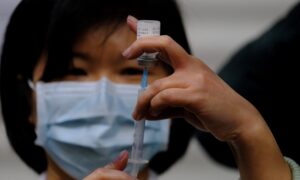Taiwan’s government will grant 3.5 million New Taiwan Dollars (about $114,000) to the family of a child who died of sudden myocarditis after receiving a second dose of the Pfizer-BioNtech COVID-19 vaccine, an official said on Sunday.
Central Epidemic Command Center (CECC) spokesperson Lo Yi-chun said the family was among the 10 applicants eligible for compensation from the National Vaccine Injury Compensation Program, Focus Taiwan reported.
Lo said the girl, who was between the ages of 5 and 11 years, went into a coma three days after getting her second dose of the COVID-19 vaccine. Authorities did not disclose the child’s identity.
The child underwent an ultrasound scan and was diagnosed with fulminant myocarditis—a severe form of cardiac inflammation which is typically caused by a viral infection—before she died.
Lo said there was no evidence that the vaccine caused the child’s death, but the possibility cannot be ruled out given the timing of her death. He said the second vaccination might have increased the child’s risk of developing the disease, leading to her death.
Focus Taiwan reported that the risk of children between the ages of 5 and 11 developing myocarditis after receiving the Pfizer-BioNtech vaccine is 4.5 to 4.8 cases out of 1 million children, citing the CECC data.
Lo said in addition to the 3.5 million NTD, the government will also pay the family 300,000 NTD (about $9,800) for funeral costs.
Vaccine injury compensation will also be awarded in three cases involving the Moderna vaccine, five cases involving the AstraZeneca vaccine, and one case involving the Bacillus Calmette-Guerin (BCG) vaccine.
Lo said that a 3-year-old child who had received the BCG vaccine as a 5-month-old developed osteomyelitis, a bone infection. He said there were indications that the child developed the condition after receiving the vaccine.
In December, Taiwan’s government awarded 300,000 NTD (about $9,800) to the family of an elderly man in his 70s who died after receiving the Moderna vaccine, Focus Taiwan reported.
Over 1,600 Children Had Systemic Reactions
More than 1,600 children in the United States between the ages of 5 and 11 experienced a systemic reaction such as fever or diarrhea after receiving one of the new COVID-19 vaccines, according to a study from the U.S. Centers for Disease Control and Prevention (CDC).
Of 3,259 children in the age group who received an updated Pfizer or Moderna vaccine and were registered in the v-safe system, nearly half experienced a systemic reaction, CDC researchers found.
Systemic reactions, defined as “usually mild” and lasting for multiple days, include fatigue, chills, nausea, abdominal pain, vomiting, joint pain, and diarrhea. On a severity scale, the category of reactions is between local reactions and severe reactions.
According to responses to v-safe—a smartphone survey system started by the CDC during the COVID-19 pandemic to monitor vaccine safety—48.9 percent, or 1,594 children, in the population of children aged 5 to 11 who got a new booster between Oct. 12, 2022, and Jan. 1, 2023, experienced one or more systemic reactions.
The most common was fatigue, followed by headache, fever, myalgia (muscle pain), and chills. The least common was a rash.
Sixty-four of the children sought medical care but none were hospitalized, according to the CDC, which published the study in its quasi-journal on Jan. 13. Most reports of needing medical care indicated that the case was not related to vaccination, according to the CDC.
Researchers also reported the number of reported adverse events among the population to the Vaccine Adverse Event Reporting System (VAERS), another safety monitoring system.
Between Oct. 12 and Nov. 20, 2022, there were 920 reports that were processed by CDC researchers, most of which were for vaccination errors such as an incorrect dosage administered. Some, including 21 for fever, were for systemic events.
The reports do not prove causality with a vaccine but are an undercount of the true number of post-vaccination events, according to studies and U.S. health officials.
Two of the reports, both after Pfizer vaccination, were for serious events, including a child who developed symptoms of a rare illness called Miller Fisher syndrome.
There were no reports of death in either system.
The public-facing VAERS site does not allow a breakdown for ages 5 to 11. Between Nov. 1, 2022, and Jan. 6, 2023, there were 46 events for children aged 3 to 5 years. During the same time, 235 events were reported for children aged 6 to 17, including two hospitalizations, seven emergency room visits, and a permanent disability.
Zachary Stieber contributed to this report.

